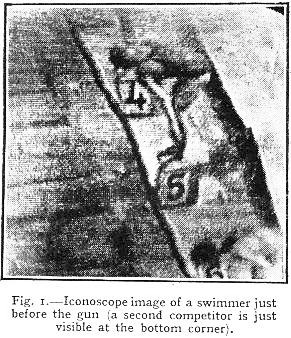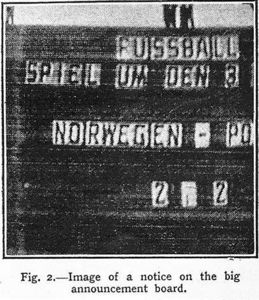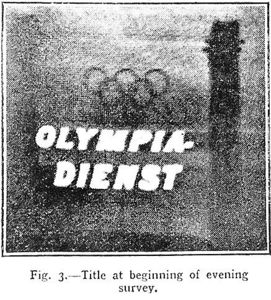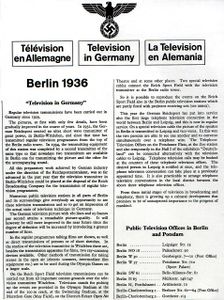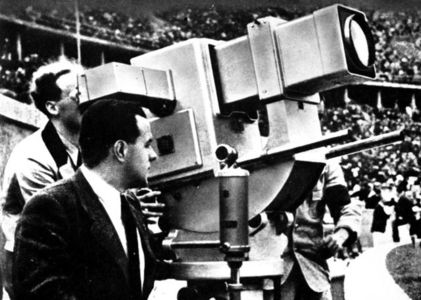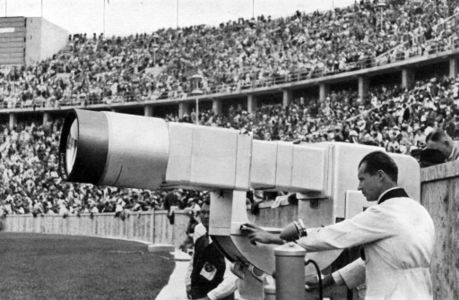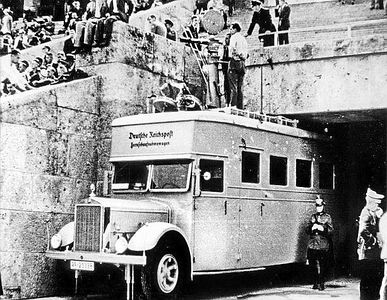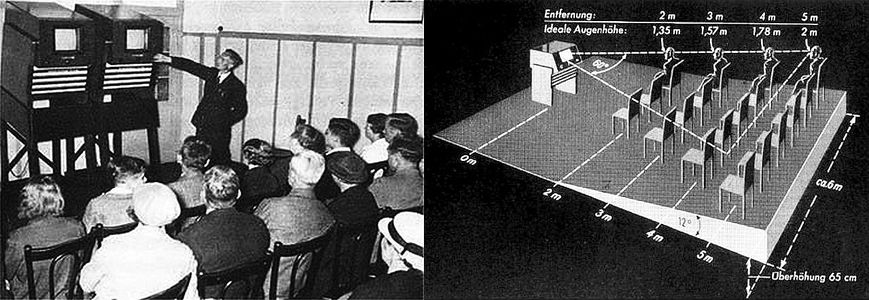1936 Summer Olympics (lost television coverage of Berlin Games; 1936)
The 1936 Summer Olympics was the tenth edition of the modern Summer Games, and was held from 1st to 16th August 1936 in Berlin, Germany. Aside from the Games' notoriety for being hosted by Nazi Germany, and for Jesse Owens winning four gold medals, the 1936 Summer Olympics was also the first ever Summer Olympics to be televised live.[1]
Background
It is suggested that the concept behind televising the 1936 Berlin Games was to enable Hitler to showcase Germany as a friendly nation worldwide, with the host's ability to house 4,000 athletes and televise them competing being part of Hitler's propaganda.[2] But prior to the start of the Olympics, television was in its infancy, and there were no means of purchasing television receivers in Germany. Television back then was restricted to around seven public viewing rooms situated in Berlin, and one located in Potsdam.[3] This would be expanded to 25 viewing rooms within the Greater Berlin area situated near the Olympic Stadium, with locals able to attend the rooms to watch the Berlin Games for free.[4] Each viewing room had a capacity of around 30-40 viewers, while an additional two theatres were to help allow 100 and 300 respectively to access the Games. In total, 162,000+ people were able to watch the Games via television live across both Berlin and Potsdam.[5] Jesse Owens himself was known to be one such viewer.[6]
To broadcast the Games, two companies, Telefunken and Fernseh, were assigned joint duty to produce coverage. Overall, it was claimed 72 hours of live Olympic coverage was transmitted by television. Telefunken relied upon RCA equipment, whereas Fernseh utilised Fransworth products, with both systems capable of broadcasting at around 180 lines and 25 frames per second.[7] In total, three different types of television camera were used to transmit the Games, with the Telefunken cameras having a 9x12cm mosaic target, with 25, 90 and 160cm lens utilised. The Telefunken ultimately provided 29 hours of broadcast, and were located at the south of the Olympic Stadium, situated at track level.
Additionally, an iconoscope camera from the German Post Office provided coverage of swimming events, contributing towards a full day of broadcasting. An additional Fernseh AG Intermediate film camera was situated at the Marathon Gate, and was responsible for broadcasting 34 hours of footage from events held at the Reich Sports Field and the May Field. Finally, a Fernseh AG image dissector camera broadcast not only events from the Olympic Stadium, but also from the Dietrich Eckart Open Air Theatre, for a total of 19 hours of broadcasting. This does question the legitimacy of the 72 hours claim, as the total footage broadcast would suggest that 106 hours were transmitted in actuality. In total, 21 cameras were utilised to broadcast the games, including three 6 feet long Fernsehkanonen cameras.[8]
Reception
Before the Olympics was broadcast, only two hours of television, from 8 to 10pm, was broadcast by Reich Broadcasting Company on a daily basis. Such was the importance of the Berlin Games that additional transmissions occurred between 10am-12pm, and from 3-7pm. Not all coverage was ultimately live; some came from telecine film camera coverage. Despite the overall popularity of the broadcasts, a review from the 21st August issue of UK technical magazine Wireless World proved negative, criticising the early television coverage as having poor clarity, with the iconoscope cameras prone to transmitting distorted pictures when poor weather was at play, which also contributed to the general unreliability of the projection receivers. The review praised the Intermediate coverage as being clear and having good contrast, but criticised its sound quality, caused mainly by the rapid development process.[9]
However, in the 11th September issue of Wireless World, Manfred Von Ardenne ultimately praised the improving direct coverage of the Games as the days went by. He stated that "useful" picture quality was made possible thanks to practical transmission techniques, and were getting closer to meeting the quality of typical film transmissions. The issue also provided a few photos of the coverage from the cameras situated at the Swimming and Olympic Stadiums.[10] The broadcasts would ultimately prove to be successful, and would pave the way for future televised coverage of Olympic Games, with the BBC providing live coverage of the 1948 London Games.[11]
Availability
Whereas much coverage of the 1936 Summer Olympics is available thanks to the film Olympia, all live television coverage of the Berlin Games is now permanently missing, as there were no means of directly recording television prior to the years after the Second World War.[12] A few photos of the television coverage have survived however, thanks to the 11th September Wireless World issue, while some photos helped to show the cameras used to transmit the Games.
Gallery
Videos
Images
See Also
- 1931 Epsom Derby (lost televised footage of horse racing event; 1931)
- 1934 Philo T. Farnsworth broadcasts (lost early television demonstrations; 1934)
- 1937 FA Cup Final (partially found footage of football match; 1937)
- 1937 International Imperial Trophy Race (lost footage of motor race; 1937)
- 1937 Wimbledon Championships (partially found footage of tennis tournament; 1937)
- 1938 Ashes Series (partially found footage of international test cricket match; 1938)
- 1938 FA Cup Final (partially found footage of football match; 1938)
- 1938 Pennsylvania Quakers football season (lost early televised college football games; 1938)
- 1939 FA Cup Final (partially found footage of football match; 1939)
- 1953 British Grand Prix (partially found footage of Formula One race; 1953)
- 1960 Daytona Races (lost CBS and NBC televised footage of NASCAR prelude events to Daytona 500; 1960)
- Arsenal vs Arsenal Reserves (lost footage of early BBC televised football match; 1937)
- Brooklyn Dodgers 2-5 6-1 Cincinnati Reds (lost footage of MLB doubleheader; 1939)
- Brooklyn Dodgers 23-14 Philadelphia Eagles (lost footage of NFL game; 1939)
- Catch-As-Catch-Can Wrestling (lost early BBC televised professional wrestling matches; 1938-1939; 1946-1947)
- Columbia Lions 1-2 Princeton Tigers (partially found footage of college baseball game; 1939)
- Darts and Shove Ha'penny (lost early BBC televised darts matches; 1936-1939)
- England 0-1 Scotland (partially found international football match; 1938)
- England 16-21 Scotland (partially found footage of rugby match; 1938)
- Fordham Rams 34-7 Waynesburg Yellow Jackets (lost footage of college football game; 1939)
- Indianapolis 500 WFBM-TV Broadcasts (lost racing footage; 1949-1950)
- The Boat Race 1938 (partially found footage of rowing race; 1938)
External Links
- Nostalgia Tech providing extensive history into how the 1936 Summer Olympics was televised.
- IMDB page for the television coverage of the 1936 Summer Olympics.
References
- ↑ Guinness World Records listing the 1936 Summer Olympics as the first televised Olympics. Retrieved 14 Sep '21
- ↑ Abandoned Spaces discussing the motive behind televising the 1936 Summer Olympics. Retrieved 14 Sep '21
- ↑ Fernseh Museum providing history of television prior to the 1936 Summer Olympics. Retrieved 14 Sep '21
- ↑ Olympics detailing facts about the 1936 Summer Olympics, including the 25 television viewing rooms used to show the games to the public. Retrieved 14 Sep '21
- ↑ Tom Schools Information Sheet providing a history of Olympic Games coverage, including noting more than 162,000 people were able to watch the 1936 Summer Olympics on live television. Retrieved 14 Sep '21
- ↑ Inside the Games discussing the extent of the television coverage, noting Jesse Owens was one of the viewers. Retrieved 14 Sep '21
- ↑ Television History listing the 1936 Summer Olympics as the first live televised sporting event, and discussing how Telefunken and Fernseh broadcast 72 hours of the Games. Retrieved 14 Sep '21
- ↑ Early Television detailing how the Games was televised. Retrieved 14 Sep '21
- ↑ 21st August, 1936 issue of Wireless World. Retrieved 14 Sep '21
- ↑ 11th September, 1936 issue of Wireless World. Retrieved 14 Sep '21
- ↑ BBC article concerning the corporation televising the 1948 London Games. Retrieved 14 Sep '21
- ↑ Web Archive article discussing how most pre-Second World War television is missing due to no means of directly recording television. Retrieved 14 Sep '21
